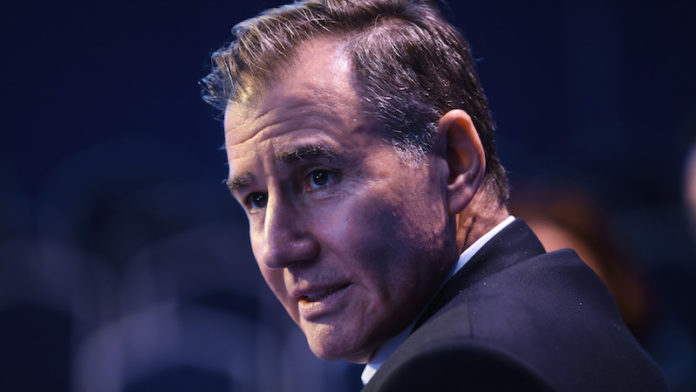
GLENCORE kept the dividend in cold storage after seeing net debt increase $2.1bn in the six months ended June, whilst commodity price declines hurt the group’s industrial assets, some of which have been mothballed.
Ivan Glasenberg, CEO of Glencore, forecast net debt would be inside the firm’s target of less than $16bn by year-end, but as of June 30 it was at $19.6bn. The board had concluded that it would be “… inappropriate to make a distribution to shareholders in 2020,” said Glasenberg.
In March, Glencore postponed its 20 US cents per share cash distribution – equal to $2.6bn – owing to financial risks posed by the Covid-19 pandemic.
However, there was high confidence net debt would be hauled in. Assuming current spot prices, industrial division earnings before interest, tax, depreciation and amortisation (EBITDA) would triple to about $7bn in Glencore’s second half taking annualised EBITDA to about $10bn. “It is credible, tangible and real,” said Steve Kalmin, Glencore CFO, of the expected recovery in the second half.
That would be enough to take free cash flow to about $4.1bn, similar to the $4.3bn at year-end 2019 and lead to a resumption of the dividend, he said.
A 65% decline in Glencore’s energy business as well as a one quarter decline in the zinc price resulted in $2.6bn net loss attributable to shareholders (2019: $226m). Price weakness, and the possibility of prevailing difficult conditions, resulted in Glencore writing down $3.2bn worth of assets.
The outcome was an interim share earnings loss of 20 US cents compared to earnings of 0.02c/share in the corresponding period of the previous year. Cash flow from operating activities before working capital of $4.32bn represented a one fifth year-on-year decline.
On an adjusted EBITDA basis, Glencore reported a 13% decline to $4.83bn for the six months. The industrial assets produced EBITDA of $2.6bn.
The marketing division, however, benefited from extraordinary swings in the oil price during the early months of the Covid-19 pandemic when industrial activity and movement of people was reduced. As a result, Glencore posted marketing division adjusted EBIT for the period of $2bn raising hopes that top-end guidance for the full year of $2.2bn to $3.2bn would be reached.
Commenting on the asset write-downs, Glasenberg spoke of “numerous challenges” and “difficult decisions” for its mines. Assets had been put into “… extended care and maintenance to rebalance markets with oversupply risk and preserve the resources for a better market environment,” he said.
But, there was a marked improvement in the firm’s African copper mines, principally its Katanga mines in the Democratic Republic of Congo (DRC). It staged a $350m year-on-year turnaround after sustaining heavy losses last year. Katanga Mining, the Toronto-listed firm in which Glencore has an 86% stake conducted a $5.8bn rights issue last year.
One of the African copper assets, Mutanda in the DRC, would remain in mothballs, however. Glasenberg also offered up few clues regarding the progress of discussions with the Zambian government over Mopani Copper Mines, the company in which Glencore has a 73.1% stake. In July, the government rejected Glencore’s effort to mothball the mine. “We will see where we end up,” said Glasenberg.
SUCCESSION
There was no significant mention of Glasenberg’s plans to retire in the firm’s comments but analysts rained in questions on the matter.
“We are working through management succession,” said Glasenberg following the interim results presentation. “We have still got one or two guys of the old generation, and then it’s time for me to move on. When that will be, we will see.”
Daniel Mate, a member of the so-called billionaires club, who was an executive during Glencore’s listing in 2011, left the company in July.
Only two of the divisional heads from the time of Glencore’s listing – Glasenberg and Tor Peterson, the head of coal trading – are still at the company. The rest, including copper kingpin Telis Mistakidis and the head of oil Alex Beard, have left.











